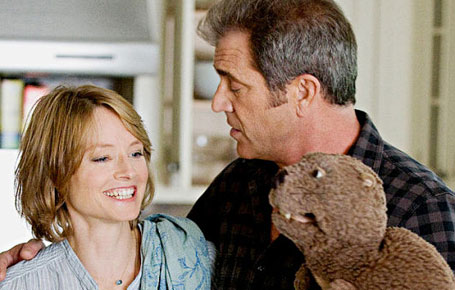Whilst
declaring a fondness for the filmís of Mel Gibson is these days
tantamount to denying the Holocaust, I must say I havenít seen too many
of Ďourí Melís films I didnít like. Sure his directorial outings tend
to be bloody, bombastic affairs, but thereís been a certain audacity to
many of his choices of subject matter, to put it mildly, and itís
difficult to think of too many directors who could handle a project like
Braveheart or Apocalypto with the aplomb and attention to
detail that Gibson usually brings to such projects.

The Beaver
is certainly audacious, but unlike the aforementioned
fare almost entirely lacking in genuine emotional resonance. Directed
by Jodie Foster, this marks her third outing behind the lens and her
first in a decade and a half. Conceptualised as a Ďdramedyí but
noticeably light on the yucks, the film revolves around a severely
depressed middle aged businessman Walter Black (Gibson) quite literally
at the end of his rope. Booted out by his long-suffering wife (Foster)
and despised by his teenage son, Black goes on a bender and makes a
bumbling attempt at suicide, only to be saved by a moth-eaten stuffed
toy he finds in a dumpster. The eponymous plushy promptly finds its way
onto Blackís hand and into his heart, and by infusing the puppet with
both a cockney Ray Winstone-esque accent and all the things he finds it
impossible to say directly, the suicidal chap is able to restore some
measure of control over his tortured existence. His wife and eldest son
initially, and understandably, think heís gone completely insane, though
his youngest seems quite smitten with the concept. Eventually though
Blackís behaviour, like the filmís premise itself, becomes simply
untenable. Following lots of farfetched nonsense and a smattering of
self-realisation, the movie builds to an uncomfortably pathos-laden
crescendo as something in the way of a valuable lesson is learned by
Gibsonís character, if not his audience.
Many
reviewers, whilst praising the strength of Gibsonís performance, have
been unable to accept the filmís central premise, and I would have to
add my small voice to this chorus. Thereís simply nothing funny or
entertaining about a severely mentally ill man being forced to
communicate to the world via a hand puppet, then blaming his loved ones
(both explicitly and implicitly) for not only his condition but also its
ridiculous expression. Black belongs in a mental institution, not a
boardroom, and when he and his puppet enact the sort of business
miracles that could only exist in a Hollywood screenplay most viewers
will be left wishing a beaver would come and gnaw Mel Gibsonís
hand off, if only to punish him for such a silly career choice.
Audio &
Video
The aspect
ratio looks more like 1.85 than the advertised 2.40, but either way
picture quality is crisp and bright. Thereís the odd bit of (presumably
intentional) muting in order to mirror the subject matter, but overall
the film presents strongly on Blu. The DTS-HD 5.1 Master Audio is
likewise sharp, and gets the occasional workout courtesy of a soundtrack
provided by talented Brazilian composer Marcelo Zarvos, who has
previously scored such diverse filmic fare as the Vanessa Hudgens
vehicle Beastly and the excellent low budget Mexican film Sin
Nombre.
Extras
Audio
Commentary with Director Jodie Foster
Deleted
Scenes with optional audio commentary
Everythingís Going to Be OK Ė Making Of Featurette